- Home
- P. T. Deutermann
Zero Option
Zero Option Read online
ZERO OPTION by P.T. Deuterma
This book is dedicated to the proposition that the only real deterrent to the use of chemical weapons against this country is if this country possesses its own chemical weapons arsenal, along with the will to use them in retaliation. Treaties, conventions, and promises to the contrary are nothing more than lethal illusions.
ACKNOWLEDGMENTS
I would like to thank Colley and George of the excellent Blood Mountain Cabins for a perspective on the north Georgia mountains area, Jane from the Georgia DFACS for her insights on state orphanages, Del Ward and Cliff Chandler for their continuing media support of my work,’ Sandy, Aubrey, and Cathy for their very helpful first readings, and, as always, Carol Edwards for her excellent copy editing. While the names of the military organizations and facilities in this book are real, I have taken some extravagant literary liberties in describing them and their operating procedures in order to enhance the dramatic structure of, the story. Any resemblance of the characters in this book to real persons, civilian or military, is unintentional and entirely coincidental.
PTD
ZERO OPTION
THURSDAY, THE DEFENSE REUTILIZATION AND MARKETING OFFICE (DRMO), ATLANTA, GEORGIA, 9:00 P.M.
Wendell Carson sat at his desk in the manager’s office wondering if he should go out to his truck and get his gun. He just knew Lambry was coming in to shake him down for more money. Should he confront Lambry, see if he could scare him into backing off? Or just play along and figure some way out of it later?
He swiveled around in his chair. Bud Lambry was an Alabama hillbilly: a long, lanky, tobacco-chewing, mush mouthed, mean-eyed sumbitch. He’d been Carson’s spotter in the warehouses for eight years, and Andy White’s before that. Let’s face it, he thought, Bud Lambry isn’t going to scare so good, so use your damn brains: Play along’with whatever he wants, then run some kind of con on ‘“him. Lambry can’t know what the cylinder is worth, so keep him in the dark. Agree to more money—anything—to keep him quiet for just a few more days until the deal goes through. After that, he didn’t care what Lambry might say, think, or do. Wendell Carson, erstwhile manager of the Atlanta DRMO, would have a million bucks in his pocket and would be down the road and gone. That said, he wouldn’t mind having his .38 in his middle drawer just now.
He looked at his watch and then heard someone coming down the main hallway of the admin building. A moment later, Bud Lambry let himself in, his suspicious eyes sweeping the office to make sure they were alone.
“Evening, Bud,” Carson said, not getting up. “You said we needed to talk?”
“Yeah, we do,” Lambry said, going over to the window and taking a quick look through the Venetian blinds into the parking lot. Then he turned around and gave Carson a hard look.’ ‘That thang,4hat red thang, how much they gonna give fer it?”
“I don’t know yet, Bud,” Carson lied. “They’re excited about it, but they’re a little antsy, too, seeing what it is.”
“But they gonna deal?”
“Oh, I think so. If they don’t, I’m not sure what the hell we can do with it. But what’s the problem now?”
“Problem’s money,” Bud said, a crafty gleam in his eye. He walked over to the desk and shook his arms out, as if he were preparing to take some kind of physical action. He leaned down, putting both his hands on the desk. Carson could smell him, an amalgam of sweat and tobacco. “That thang’s gotta be worth a whole shitpot full a money.”
Carson smiled. “And let me guess—you want a bigger cut, seeing this thing’s special. And you’re the one who found it.”
“Damn straight. We ain’t never lifted nothin’ like this’n before.”
Carson nodded, pretending to think about it. Then he nodded again. “I agree, Bud. This thing’s going to be worth a small fortune. In fact, it’s so big that I’m thinking about just clearing the hell out of here once the deal goes through. First, because the money is going to be major, and second, because the heat is going to be major once the Army finds out it’s missing.” “Yeah,” Bud said, relaxing a little. “Reckon I might do likewise.”
“How’s half sound, Bud? After all, you were the one who found it.”
Lambry blinked. He had obviously planned to ask for -half and settle for whatever he could get. Carson had surprised him. But then Lambry’s eyes narrowed in suspicion.
“Okay,” he said. “An’ I wanna be there, it goes down.”
“No problem, Bud. In fact, I need you there. For the money this thing’s going to bring, I wouldn’t mind some backup, you know what I mean?”
Bud straightened back up. “All right, then,” he said. “You lemme know.
Them boys give us enny bullshit, I’ll fixer asses good. I got me some guns.”
“They’ve never stiffed us before. No reason to think they will now.”
Lambry looked at him, trying to figure out what Carson’s angle was. I’ve been too agreeable, Carson thought. Should have haggled a little. Lambry looked down at the floor for a second, and then back at Carson, a hard look in his eyes.
“And yew,” he said, “don’t yew be thinkin’ you cin run enny damn tricks, Carson. I want whut’s mine.”
“I’m going to make the arrangements tomorrow,” Carson said as smoothly as he could. Lambry had a violent streak that had gotten him in trouble twice before down in the warehouses. He was known to carry a knife, and he wasn’t shy about pulling it.
Carson got up to indicate this little farce was, over. He already had an idea of how to dupe Lambry. “I’ll catch you on the late shift in demil tomorrow night. Let you know what they decide. But remember now, not a word to anyone.”
Lambry snorted. “Ain’t never run my mouth, and that’s a damn fact.” Then he left, slamming the door.
Carson exhaled and sat back down. Fucking Lambry had been getting bolder and bolder lately. He would have to do something, although he wasn’t sure what that would be. Wendell Carson was no Andy White. Big Andy would have ambushed Lambry with a two-by-four down in the warehouses one afternoon and beat the shit out of him.
He gave Lambry ten minutes to clear the building, and then he got up and locked his office door. He adjusted the blinds and checked the parking lot, but his truck was the only vehicle left out there. Then he walked over to the wall-length bookcase and reached up behind the three-ring binders on the top shelf. He withdrew the prize: a heavy red plastic tube, four feet long, about four inches in diameter, and covered with stenciled lettering, all U. S. Army alphabet soup. There were four stainless-steel snaps at each end of the tube. Inside was the actual cylinder, itself also stainless steel, and sealed at each end with wide knurled caps. The whole assembly weighed about fifteen pounds.
Carson stared down at it. He had no idea what all the nomenclature meant, specifically, but when he’d read it over the phone to Tangent, his client in Washington, and told him where the cylinder had come from, Tangent had reacted as if he’d been hit by a brick. Tangent had gotten back to him in literally five minutes, offering $1 million in cash. Just like that. And now Brother Bud thought he was going to get half.
In your dreams, Cracker, Carson thought. This thing right here is the holy grail. Wendell Carson’s main chance. Who’d have thought it? he mused as he put the red tube carefully back up on the bookcase. After all these years of skimming the surplus auctions, he’d hit the jackpot with a cylinder of nerve gas.
FRIDAY, HEADQUARTERS OF THE DEFENSE CRIMINAL INVESTIGATIVE SERVICE (DCIS), WASHINGTON, D. C., NOON
Senior Investigator David Stafford stood out in the hallway with his boss, Colonel Parsons, and listened impassively to the sentence of exile.
“Atlanta, Georgia, Dave. There are worse places in this world.”
Stafford nodded his head. sl
owly, not looking at Parsons or at any of the people passing them in the busy hallway.
“And you know I’m doing this to save your ass, don’t you? Ray Sparks is the southeastern regional supervisor. You and he go back. He’s willing to stash you there, no questions, no bullshit. You go down there, you work this DRMO auction thing, and you keep a low profile. Get your arm well, get Alice and the divorce off your mind, and then we’ll bring you back once everybody up here calms down.”
Stafford nodded again, not really listening. This hallway meeting was the culmination of the worst eighteen months of his life. He felt like telling the colonel, Thanks, but why don’t I just resign, make it easier on everybody? Except that, at the moment, he had nowhere to go, a mortgage and car loans to pay, a resume with political feces all over it, a useless right arm, a wrecked marriage, and some serious enemies in high places right here in River City. It wasn’t like he had a lot of options … The colonel was watching him, waiting for some kind of reply.
“I appreciate it, boss,” Stafford said, still staring down at the floor.
“I hate it, of course. I hate every bit of it.” Then he looked up at the colonel. “But I really do appreciate it. Where the hell is Georgia, anyway?”
Parsons grinned. “That’s the ticket. You’ll be pleasantly surprised. But remember, no bomb throwing. No making big deals out of a little deals.
This DRMO case has been around for a while, and there’s probably less there than meets the eye. So once you get there, take your time. Your TDY orders are ready down at Travel. Get ‘em and get gone, before the Communists find out about it.”
The colonel clapped him once, forcefully, on his left shoulder, thank God, and then he was alone in the hallway, conscious of the stares and the muted comments. He took a deep breath and headed down to get his travel orders. The sooner the better, the colonel-had said. Well, what the hell, he thought. It might be a nice change to go someplace where his first name wasn’t Goddamn.
FRIDAY, THE DRMO, ATLANTA, 8:30 P.M. On Friday evening, Carson returned to the DRMO parking lot after getting dinner at a local restaurant. He parked his green Army-issue pickup truck in his reserved spot in front of the building, then lowered his window. He could hear over the soft purr of the truck’s engine the demil line running, the sound of rending metal clearly audible behind the admin building. He rolled the window back up and shut the truck down.
Eight-thirty. About thirty minutes more process time on the evening shift. The assembly teams would have left hours ago, after lining up at the feed conveyor belt with stuff to be shredded. Then it would be just the demil operator left to run the line until the conveyor came up empty, after which he would secure the plant. Carson, as manager, controlled the shift assignments. He had made sure Bud Lambry would be on this evening’s shift.
Carson had stopped by a metal shop out on State Road 42 and had a machinist cut a section of pipe about three inches in diameter, shine it up on a lathe, and fit two threaded caps over the ends. The size had been right, but the weight was wrong, so he’d had them fill it with sand. The lathe operator had made a joke of asking Carson if he was making a pipe bomb. Carson played along, told him he was going to blow up the IRS building in Chamblee, just outside of Atlanta. The lathe operator had asked if he wanted some help.
His plan was to take the sand-filled cylinder to his office, switch it with the real one in the red tube, and then carry the thing across to the demil building and explain to Bud that the operation was” blown, that they were going to have to destroy the cylinder. The only problem would come if Bud insisted on opening the red packing tube, at which point he would see that the Army warning labels were missing from the substitute cylinder. Carson didn’t know whether or not Lambry had ever opened the outer tube, but he was going to have to take that chance. He had tried peeling one of the labels off the actual cylinder and it had immediately torn, probably by design, to indicate tampering. The way to do this was to go fast, to go in there looking all hot and bothered, glancing over his shoulder for cops, and pitch the thing onto the demil line before Lambry had time to think about it. Lambry was a dumb ass; it should work.
He looked again at his watch and then pulled a portable cell phone out of his briefcase and punched in the DRMO number, followed by the extension for the demil control room. The phone rang five times before it was picked up. Lambry’s voice came over the line, barely audible over the shattering noise of the machine. “Demil. Lambry.”
“It’s me. How much longer on the run?”
“Thirty minnits, mebbe. You got sumpthin’?”
“We’ve got us a big problem. I’m driving in. I’ll come over there.
Nobody around, is there?”
‘ ‘Naw. Whut kinda big problem?”
“Tell you when I get there, Bud,” Carson replied, then hung up. Five .minutes later, he was walking across the tarmac, carrying the red packing tube with the fake cylinder inside. The outside lay-down area was lighted with large rose quartz halogen security lights. He walked confidently across the tarmac, the noise of the demil machine, which the crew all called “the Monster,” getting louder -as he approached. Then he stopped. There would be no way to talk in there, not with the Monster going full bore. Instead, he went over to the adjacent warehouse, the one from which the Monster was fed, and let himself in through the keypad lock system.
The lights were on in the feed-assembly area. He checked to make sure no one else was in the building. The feed belt was running, and he could see that there were about sixty feet of material left on this shift’s demil run. The belt was crawling forward at about two miles per hour, slowly enough to give the machine in the next building time to chew.
Even with the rubber noise-barrier strips in the opening between the two buildings, the racket from the Monster was crashingly loud.
He walked over to the steel door connecting the warehouse and the demil building. He looked through the small window in the door, but it revealed only the business end of the Monster, with its gaping maw at the end of the belt, and those seven huge band-saw blades descending voraciously into the materials consigned to destruction. He couldn’t go through, for only the demil operator had the keys. Mounted just to the right of the door was a telephone. Looking around again to make sure no one else was in the warehouse, he punched in the control console number.
“Demil. Lambry.”
“Leave it running and come next door, Bud,” he said, almost shouting.
“We’ve gotta talk. And we don’t have much time.”
He hung up before Lambry could protest. He stepped away from the connecting door and walked -back over to the conveyor line near the screened opening of the inter building aperture. A minute later, there .was a shadow of movement in the small window in the door, and Bud Lamdry stepped through, wearing his hearing protectors and hard hat above his long-nosed face. He saw Carson and paused, as if unsure of what was going on; then he came over, his eyes widening at the sight of the red tube.
Carson hastily explained that the sale was off, that the client had backed out. They were saying the thing was much too hot, too dangerous.
“They said we’d better destroy the damn thing before the Army finds out.
They suggested we put it through the demil machine. They also told me not to be there when it goes into the Monster.” “Why?” Bud said, an anguished expression on his face. “That thang’s gotta be worth some money some wheres!” Carson shook his head. “They said no way. Too hot. Too dangerous. Said there’d be hell to pay when the Army found out it was missing. That they’d execute someone for losing it, much less for .trying to sell it.
I had no idea, Bud. I don’t think we have any choice. We have to put it on the line here. There’s no other place to dispose of it.”
Without giving Bud any more time to argue, he dropped the red tube down on the conveyor belt, about ten feet upstream of the aperture between the two buildings. Bud just stood there for a minute as the red tube advanced down the line, h
is piggish little eyes following. Then, to Carson’s dismay, Lambry stepped forward and snatched the tube off the line.
“Now you wait jist a damn minnit,” he said. He put it down on the floor.
Keeping one eye on Carson, he knelt down and started to undo the snaps on the packing tube.
Carson thought fast. Jesus Christ, now what do I do? He’ll know I switched it! He looked around desperately for some kind of weapon, but there was nothing close, and Bud now had the last snap undone. He opened the case, pulled out the fake, and pitched the red tube back onto the belt. He stared at the cylinder for a moment, and then, still in a crouch, whirled on Carson.
“You sumbitch!” he yelled, dropping the fake on the floor. “This ain’t it! You done switched it, you sumbitch!” Eyes wild, he straightened up, snatched a folding knife out of his pocket, and, in one practiced motion, opened it, and swiped furiously at Carson’s stomach. Carson, already recoiling, felt the blade tip just touch his jacket. There was no mistaking the killing fire in Lambry’s eyes. Without really thinking, he kicked out at Lambry, hitting him in the groin. Lambry grabbed himself, shrieking in pain, dropped the knife, and stumbled backward, tripping over the edge of the conveyor belt. He was so tall that he ended up sprawling across the belt, on his backside, his hard hat flying. Almost immediately, the moving belt dragged him up against a support stanchion and turned him parallel. Lambry, flailing wildly, inadvertently stuck his right hand between the belt and one of the rollers. As Carson watched in horror, the belt roller mangled Bud’s right hand. Bud screamed anew while he thrashed around on the belt, trying to extract his hand, until he fainted from the excruciating pain.
Carson just stood there, even when he realized that Bud had passed out.
But the belt never stopped moving, carrying Lambry’s limp form into the steel safety cage enclosure flanking the interbuilding aperture. By the time Carson realized what was going to happen, he could no longer reach Lambry through the screens.

 The Nugget
The Nugget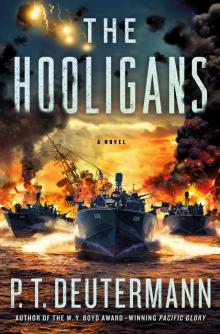 The Hooligans
The Hooligans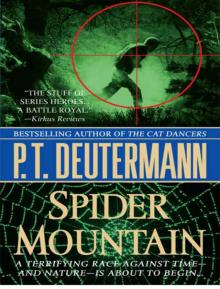 SPIDER MOUNTAIN
SPIDER MOUNTAIN![Cold Frame [retail] Read online](http://i1.bookreadfree.com/i/03/19/cold_frame_retail_preview.jpg) Cold Frame [retail]
Cold Frame [retail] Sweepers
Sweepers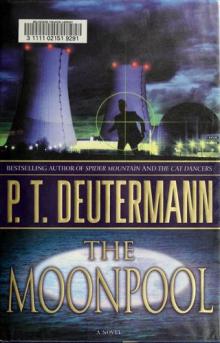 Cam - 03 - The Moonpool
Cam - 03 - The Moonpool Trial by Fire
Trial by Fire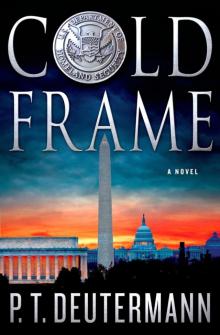 Cold Frame
Cold Frame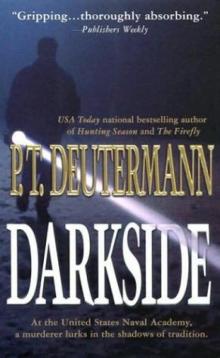 Darkside
Darkside Cam - 04 - Nightwalkers
Cam - 04 - Nightwalkers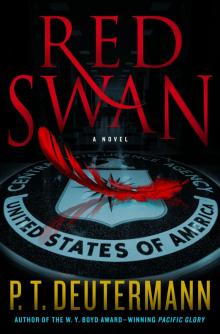 Red Swan
Red Swan The Commodore
The Commodore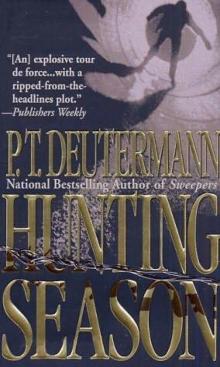 Hunting Season
Hunting Season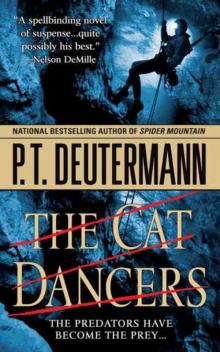 The Cat Dancers
The Cat Dancers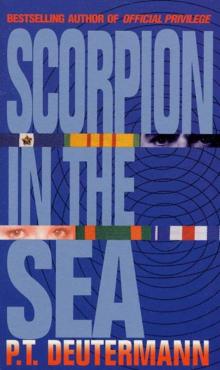 Scorpion in the Sea
Scorpion in the Sea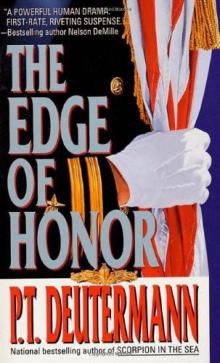 The Edge of Honor
The Edge of Honor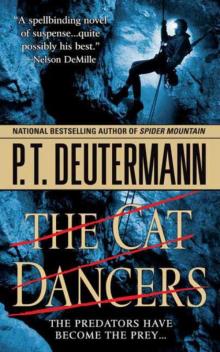 The Cat Dancers cr-1
The Cat Dancers cr-1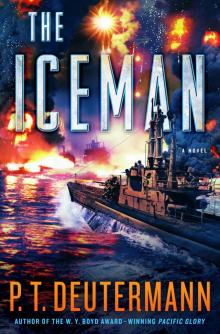 The Iceman
The Iceman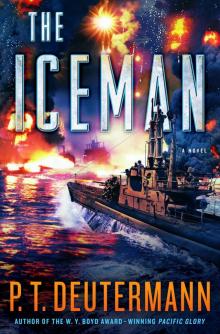 The Iceman_A Novel
The Iceman_A Novel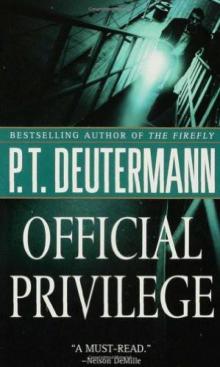 Official Privilege
Official Privilege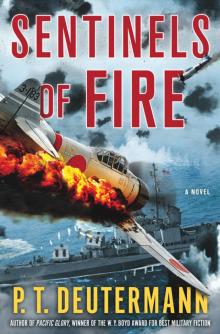 Sentinels of Fire
Sentinels of Fire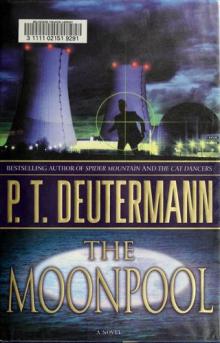 The Moonpool cr-3
The Moonpool cr-3 Nightwalkers cr-4
Nightwalkers cr-4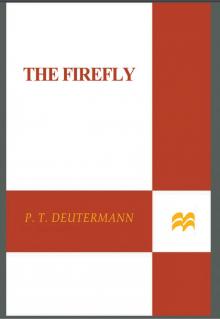 The Firefly
The Firefly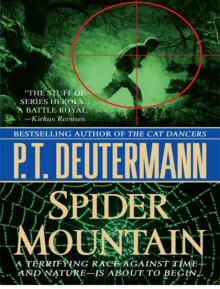 Spider mountain cr-2
Spider mountain cr-2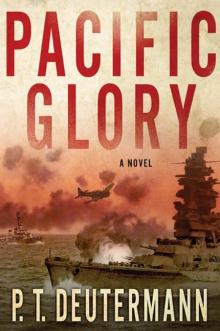 Pacific Glory
Pacific Glory The Last Man
The Last Man